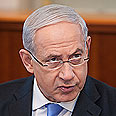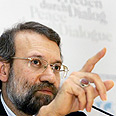

"I would prefer that the US attack Iran, but the likelihood of that is small," he said. "In any case – even if the US attacks, missiles will be fired at Israel."
Related stories:
- Iran tests upgraded version of short-range missile
- Rumsfeld: Israel needs to delay Iran's nuke program
- Analysis: Israel realizes: Only US can stop Iran
This scenario is not as grave as the possibility that Iran obtains a nuclear weapon, he said. "Even if missiles fall, it's still preferable to an atom bomb over our heads. If Iran obtains an atom bomb it'll be over Israel's head, not anyone else's."
The prime minister countered the claim that a military strike will set back Iran's nuclear program just a couple of years. "They said the same thing about the Iraq reactor," he noted. "They said the (Iraqis) could rebuild the reactor within two years, they still don't have a bomb."
'Sanctions ineffective'
Netanyahu estimated that Iran is a few months away from becoming nuclear. "The time frame isn't measured in days or weeks, but not in years either." He credited Israeli policy with the toughening of the sanctions but noted that other than hurting Iran's economy they have yet to compromise the nuclear program.
Addressing the "day-after" debate, he said: "I'm tired of this atmosphere. Stop talking 'for the record'. I am responsible and if a commission of inquiry is established it will be on me. I take full responsibility."
Sources in the meetings got the impression that a decision about a strike has yet to be made, but that the prime minister is trying to create the impression he is determined to act. Netanyahu insisted that he is being completely rational in considering the matter.
The prime minister's bureau said in response, "We don't comment on reports from closed meetings, even when the quotes are inaccurate."
Iran: Zionists feel fear
Meanwhile, Iranian Parliament Speaker Ali Larijani warned Israel to drop its recently intensified war rhetoric against Tehran, but pointed out that the Israelis' hawkish remarks indicate their fear of the Islamic Republic, the Fars news agency reported.
"Today, the Zionists have uttered words against Iran and Hezbollah bigger than their mouths, but reading between the lines one can find out that Zionists feel fear," Larijani said on Sunday.
He made the remarks, addressing an open session of the parliament in Tehran.
It has also been reported that senior ministers are claiming they are not being briefed on the Iranian issue. "We are expected to serve as a rubber stamp," said a member of the political-security cabinet.
"It's an event of historic and strategic importance. How does one expect us to vote yes or no when the day arrives," one minister said.
The prime minister's bureau dismissed the claims. "The discussions on the most sensitive issues over the past three years have been unprecedented in scope, frequency and depth," a statement said.
Dudi Cohen and Tova Tzimuki contributed to this report
- Receive Ynetnews updates
directly to your desktop















